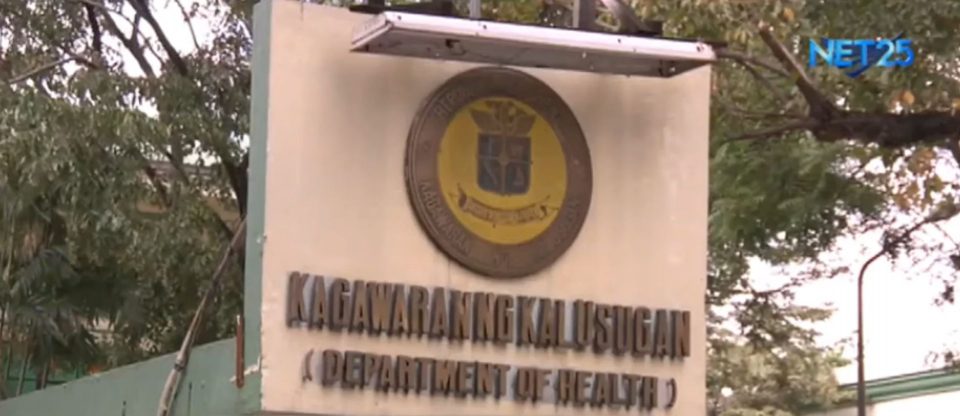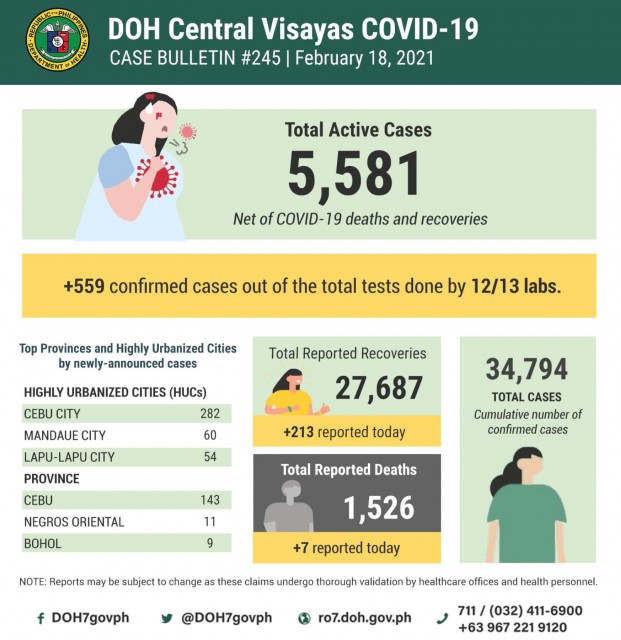Investigation underway as “containment measures” put in place

(Eagle News) – Health authorities found two new mutations of the COVID-19 virus, SARS-CoV-2, amid an alarming rise in cases in Cebu.
The Department of Health regional office in Central Visayas referred to the two mutations as “variants of concern.”
Dr, Mary Jean Loreche, the spokesperson of DOG region 7 said the two new mutations were what could be called “variants under investigation.”
The DOH regional office tagged these new mutations as E484K and N501Y.
In a press briefing, Loreche said that these two new mutations were found in 37 of 50 samples that were subjected to genomic sequencing as they try to trace the so-called UK variant, or variant B.1.1.7.
In the genome sequencing, scientists found the presence of these two new COVID-19 virus variants.
“Out of the 50 samples that were subjected for genomic sequencing, 37 of them were positive of these two mutations of concern. That’s equivalent to 58 percent,” Loreche said.
“These are now what we call a variant of concern. There is no name yet. They have not identified the entire sequence,” she noted.
The new mutations were found in the first batch of samples sent to the Philippine Genome Center for genomic sequencing. This initial batch covered the period January 30 to February 2, and included samples from Cebu City, Mandaue City, Lapu-Lapu City, and Cebu province. These are also the same areas in Central Visayas where there was a reported increase in COVID-19 cases recently.
https://youtu.be/3Zessg_SmME
-Global concern-
Loreche also said that the new mutations appeared to be linked to increased transmissibility, and could thus be of “global concern.”
“These two mutations of concern are also of global concern. Not only for us in Central Visayas. Because apparently these are the mutations related to increased transmissibility,” she said.
Dr. Jaime Bernadas, regional director of DOH 7 said that the public should also be made to understand that the COVID-19 virus can mutate, as had been observed globally.
He said that the two mutations of the virus in Cebu needed further study and surveillance.
“What we intend to do further is for every one to be aware that the virus can mutate, the virus can change its characteristics,” he said.
Loreche also said that these two new mutations of the COVID-19 virus needed to be investigated further.
“Whether these are going to be more virulent, meaning to say mas grabe ang sipa ng virus na ito to cause a more severe disease or to be more pathogenic, mas mahirap siya, we have to await first,” she said.
Bernades said that as of now, health authorities had already conducted “containment measures” as they try to complete the genome sequence of the two new virus mutations.
He said that the patients who had been found to have the new virus mutations had already recovered.
“As of this point, we already did the necessary containment measures to prevent rapid spread and transmission, and the patients (infected with the mutations) have since recovered,” he noted.
DOH region 7 had earlier sent 161 swab samples from COVID-19 infected patients to the Philippine Genome Center (PGC) for genomic sequencing as part of efforts to trace the so-called UK variant.
So far, 60 have tested negative for the presence of B.1.1.7 variant or the UK variant.
Cebu has been classified under the more relaxed Modified General Community Quarantine (MGCQ) protocol.
As of Thursday, Feb. 18, Central Visayas has 5,581 total active COVID-19 cases. The cities with the most reported new cases were Cebu City (282), Mandaue City (60), and Lapu-Lapu City (54). Cebu province is also the top province in the region with the most reported new cases at 143.

Last week, the Philippine Nurses Association in Cebu issued a statement sounding the alarm on the increase in virus cases in Cebu. They called for a balance between further opening up of the economy and the need to strictly adhere to health protocols to prevent COVID-19 transmission.
“Because we do not want to repeat the unfortunate history of nurses suffering from burnout and exhaustion, we call for solidarity among the public to continue to adhere to the health and safety protocols set by the government,” said PNA-Cebu in a position paper released on Thursday, Feb. 11, 2021.
(Eagle News Service)








